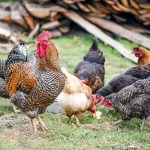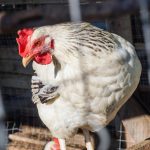Chicken welfare is an important aspect of animal agriculture that is often overlooked. The welfare of chickens not only affects the quality of the meat and eggs they produce but also has ethical implications. Chickens are sentient beings that deserve to be treated with respect and compassion. Ensuring their welfare is not only the right thing to do, but it also benefits the farmers and consumers. When chickens are raised in a stress-free and comfortable environment, they are healthier, produce better quality products, and are less likely to exhibit aggressive behavior. Additionally, consumers are becoming increasingly concerned about the welfare of the animals that produce their food, and are willing to pay a premium for products that are certified as being ethically raised. Therefore, it is in the best interest of farmers to prioritize the welfare of their chickens.
Furthermore, the welfare of chickens is also important from a public health perspective. Stressed and unhealthy chickens are more susceptible to diseases, which can have serious implications for food safety. By ensuring that chickens are raised in a healthy and stress-free environment, farmers can reduce the risk of disease outbreaks and minimize the need for antibiotics and other medications. This not only benefits the chickens but also contributes to a safer and more sustainable food system.
Table of Contents
The Challenges of Cooped Chickens
One of the biggest challenges in ensuring the welfare of chickens is the practice of cooping, or confining chickens to small cages or crowded indoor spaces. Cooping is a common practice in industrialized poultry farming, where large numbers of chickens are raised for meat or egg production. While cooping may be convenient for farmers in terms of space and resource management, it poses significant challenges for the welfare of the chickens. Cooped chickens are often unable to engage in natural behaviors such as foraging, dust bathing, and roosting, which can lead to stress, frustration, and even aggression. Additionally, overcrowding can lead to poor air quality, increased risk of disease transmission, and higher levels of stress hormones in the chickens.
Cooped chickens also face challenges related to physical health. The lack of space and opportunity for exercise can lead to muscle weakness and skeletal problems. Additionally, cooped chickens may be more prone to injuries from pecking and fighting due to the stress and frustration caused by overcrowding. These challenges not only impact the welfare of the chickens but also have implications for the quality and safety of the products they produce.
The Effects of Cooping on Chicken Behavior
The practice of cooping has significant effects on the behavior of chickens. When chickens are confined to small cages or crowded indoor spaces, they are unable to engage in natural behaviors such as foraging, dust bathing, and roosting. This lack of stimulation can lead to boredom, frustration, and even aggression in the chickens. In crowded conditions, chickens may become more prone to pecking and fighting, which can result in injuries and stress. Additionally, cooped chickens may exhibit abnormal behaviors such as feather pecking and cannibalism, which are indicators of poor welfare.
Furthermore, cooped chickens may also experience higher levels of stress due to the lack of space and opportunity for exercise. This can lead to an increase in stress hormones such as corticosterone, which can have negative effects on the health and welfare of the chickens. Chronic stress can weaken the immune system, making chickens more susceptible to diseases and reducing their overall well-being. These behavioral effects not only impact the welfare of the chickens but also have implications for the quality and safety of the products they produce.
Managing Cooped Chicken Welfare
Despite the challenges posed by cooping, there are measures that can be taken to manage and improve the welfare of cooped chickens. One approach is to provide enrichments that allow chickens to engage in natural behaviors and alleviate boredom and frustration. This can include providing access to perches, dust bathing areas, and objects for pecking and scratching. Enrichments not only improve the welfare of the chickens but also contribute to a more stimulating and healthy environment.
Another important aspect of managing cooped chicken welfare is ensuring proper ventilation and air quality in indoor spaces. Good ventilation can help reduce ammonia levels, control humidity, and minimize the risk of respiratory diseases in chickens. Additionally, maintaining clean and dry litter can help prevent foot pad dermatitis and other health issues related to poor hygiene. Proper management practices such as regular cleaning, monitoring stocking density, and providing adequate nutrition and water are also essential for managing cooped chicken welfare.
Alternatives to Cooping Chickens
In recent years, there has been growing interest in alternative housing systems that prioritize the welfare of chickens. One such alternative is free-range farming, where chickens have access to outdoor areas where they can engage in natural behaviors such as foraging and dust bathing. Free-range systems provide more space and opportunities for exercise, which can contribute to better physical and mental well-being for the chickens. Additionally, free-range systems have been associated with higher quality products such as eggs with richer yolk color and meat with better texture.
Another alternative to cooping is cage-free housing systems, where chickens are housed in open barns or aviaries with access to perches, nests, and litter for dust bathing. Cage-free systems provide more space and opportunities for natural behaviors compared to traditional cage systems. Additionally, cage-free systems have been associated with lower levels of stress hormones in chickens and reduced risk of injuries from pecking and fighting.
The Role of Regulation in Chicken Welfare
Regulation plays a crucial role in ensuring the welfare of cooped chickens. In many countries, there are laws and regulations that set standards for housing, management practices, and animal care in poultry farming. These regulations aim to ensure that chickens are raised in environments that meet their behavioral, physical, and psychological needs. For example, regulations may specify minimum space requirements per chicken, ventilation standards, and guidelines for enrichments such as perches and dust bathing areas.
Additionally, regulations may also address other aspects of chicken welfare such as transportation, handling, and slaughter practices. For example, regulations may set standards for the handling and transportation of chickens to minimize stress and injuries. Furthermore, regulations may require that slaughter practices are conducted in a humane manner to minimize pain and distress for the chickens.
Promoting Awareness and Advocacy for Cooped Chickens
Promoting awareness and advocacy for cooped chickens is essential for driving positive change in poultry farming practices. Consumers play a crucial role in influencing industry practices through their purchasing decisions. By choosing products that are certified as being ethically raised or produced using alternative housing systems such as free-range or cage-free, consumers can send a strong message to farmers and retailers about their preferences for animal welfare.
Furthermore, advocacy groups and organizations play an important role in raising awareness about the welfare issues faced by cooped chickens and advocating for better practices. These groups work to educate consumers about the impact of cooping on chicken welfare and encourage them to support ethical farming practices. Additionally, advocacy groups may work with farmers and industry stakeholders to promote alternative housing systems and provide resources and support for transitioning to more welfare-friendly practices.
In conclusion, ensuring the welfare of cooped chickens is essential for ethical, economic, public health, and environmental reasons. While cooping poses significant challenges for chicken welfare, there are measures that can be taken to manage and improve their well-being. Alternative housing systems such as free-range and cage-free offer promising alternatives that prioritize the natural behaviors and well-being of chickens. Regulation plays a crucial role in setting standards for chicken welfare in poultry farming practices. Promoting awareness and advocacy for cooped chickens is essential for driving positive change in industry practices and encouraging consumers to support ethical farming practices. By prioritizing chicken welfare, we can create a more sustainable and compassionate food system for both animals and humans alike.
Meet Walter, the feathered-friend fanatic of Florida! Nestled in the sunshine state, Walter struts through life with his feathered companions, clucking his way to happiness. With a coop that’s fancier than a five-star hotel, he’s the Don Juan of the chicken world. When he’s not teaching his hens to do the cha-cha, you’ll find him in a heated debate with his prized rooster, Sir Clucks-a-Lot. Walter’s poultry passion is no yolk; he’s the sunny-side-up guy you never knew you needed in your flock of friends!







